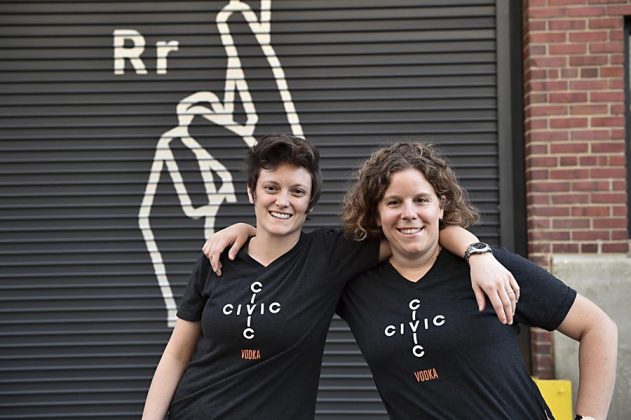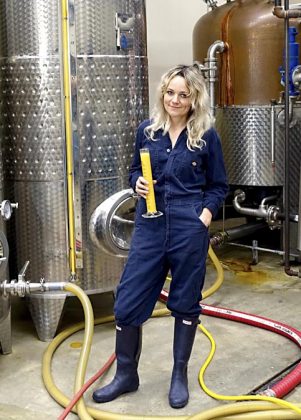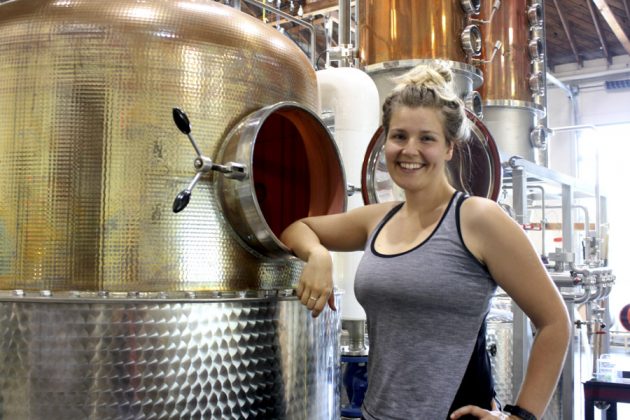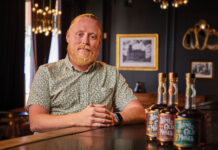According to the Craft Spirits Data Project, there are more than 1,300 craft distilleries in the USA, and only a handful with a female distiller at the helm.
“At conferences, I’m typically greeted with shock and awe when I reveal my profession,” said Lauren Patz, head distiller for Spirit Works Distillery in Sebastopol, California. “It’s just not the first job that comes to mind when women think about what they want to do with their life,” said another.
But why? It probably has something to do with social conditioning. The tough manual labor required often dominates the job description and there’s a lack of visibility into the distilleries themselves. Regardless of why there’s a lack of female distillers, every year more and more women are joining the ranks of the craft-distilling community and here are three to take note of.
Rachel Cole Gardner “My love for ‘making’ started on my grandparents’ maple farm in the Adirondacks,” says 35-year-old Rachel Cole Gardner, co-founder of Republic Restoratives (RR) in Washington. D.C. “I helped collect buckets of sap and boiled it down to sweet maple syrup.”
Though its sticky germination began when she was a little girl, it wasn’t until college that she learned to ferment beer. Then her taste for whiskey and pairing booze with cheese collectively sparked her passion for making spirits.
Gardner, a native of Saratoga Springs, NY, developed her distilling chops at the dawn of the distilling boom in Seattle, WA. She toured every craft distillery open to the public, peppering staff with questions about how they got their start, what they were most proud of and what lessons they learned along the way. Eventually she connected with her mentor, Berle “Rusty” Figgins Jr., a distiller, consultant and engineer, and got some hands-on experience assisting him with the construction and operation of several distilleries.
She received her Craft Distilling Certificate from the Spirits Institute of Puget Sound, has taken Moonshine University courses, attends ADI workshops, reads a ton of literature and listens to every spirit-related podcast to stay at the cutting edge of America’s burgeoning craft-distilling industry, especially now that she’s overcome her biggest challenge to date—getting Republic Restoratives started with her childhood best friend, Pia Carusone.
“Raising the money to build our facility was a beast,” said Gardner. “If you’re not independently wealthy or have a history in the business spanning generations, then you’re at a disadvantage.”
“We could not have opened our doors without the support and encouragement of a vast community of backers and we take that commitment seriously,” Gardner said with pride, thinking about the support they’ve received thanks to their simple belief that cocktails can create community.
But being community-driven is more than just how the distillery and craft cocktail bar raised its series A: It’s how Gardner and Carusone continue to evolve professionally and yet remain authentic, transparent and true to their friends, family and customers.
“We’re confronting new challenges all the time when it comes to controlling the quality of our product from start to finish,” said Gardner. “Generally we reach out to our fellow distilleries in the neighborhood for solutions, equipment suggestions and process innovations.”
The distillery opened its doors on Mother’s Day, 2016, thanks to the huge success of an Indiegogo crowdfunding round, making it one of the few women-owned and -operated distilleries in the USA. As the brand grows, Gardner’s days start earlier and end later. When she isn’t laughing with customers and staff, drinking her fifth cup of coffee or operating Gladys, their forklift, she’s continuously trying to find ways to reduce their water consumption, lower energy usage and improve the performance of her 4,000-liter reciprocating still.
Though every brand in the Republic Restoratives family has a place in Gardner’s heart, Civic Vodka, their first offering made from 100 percent North American corn, gave the place a platform to connect and build trust with customers. While they distill and age their own spirits, Republic Restoratives is open about using spirits that are sourced on the open market. Their Borough Bourbon is a Kentucky whiskey finished on-site in Sauvignon Blanc barriques, and what they’re most known for as of March 2017 is their Rodham Rye, a blend of two rye whiskeys released in honor of Hillary Clinton and the trailblazing women who fought to vote and end Prohibition.
“But, when it comes to process, our apple brandy is my absolute favorite,” Gardner says. “No smell fills the space like an apple fermentation. Playing with the varieties of apples and yeast has become a new passion of mine.”
As far as what keeps her up at night? Besides her dog Zuni’s snoring, Gardner would like to spend more time outside the distillery meeting local farmers and millers.
She jokes that a lack of properly-sized work gloves—not gardening gloves—could be the reason for a lack of female distillers, but regardless of gender, has this advice for anyone just getting started.
“Show your strengths, be humble and make as many mistakes as early as you can. Gravity can be your best friend. And invest in a second pump, because the inability to move liquid can be crippling and a backup can be a lifesaver.”
Morgan McLachlan No stranger to working in a male-dominated industry, Morgan McLachlan used to be a member of the camera operators union working behind the scenes in TV and film when females only represented about five percent of camera professionals. Today she’s head distiller at The Spirit Guild, one of Los Angeles’ downtown Arts District’s few remaining manufacturing businesses.
“A few of us, myself included, occasionally encountered misogyny, but that just made me strive to perform my job better,” McLachlan says.
Today the 37-year-old Vancouver, Canada, native follows in the footsteps of entrepreneurial craft distillers who came before her in running The Spirit Guild with partner Miller Duvall.
“I am out of my comfort zone and doing something for the first time every day,” she says. ”But it’s all an incredible challenge, and totally worth it.”
Her fascination with distilled spirits started as an undergrad while working on a cultural history project in Prague with a Kafka scholar. While traveling through eastern Europe she fell in love with brandies, schnapps and anything “small-batch and local” to the region.
A career in Hollywood, and many years later, McLachlan came up with the idea of opening a distillery in 2012 when visiting Miller’s family ranch 100 miles outside of Los Angeles on the banks of the Kern River. She and Miller, a sixth-generation California rancher, stood among groves of citrus, walnuts, olives and almonds, and asked themselves two questions: Why isn’t there a regional Southern California spirit, and what would it be made of?
Three years later they finished their build, secured their distilling permits and are making spirits from citrus.
Today, you’ll find Morgan wearing different hats as she builds the brand and manages business development, sales, operations, production and the tasting room. But her passion lies in the creation of delicious spirits; specifically their Astral Pacific Gin and Vapid Vodka distilled from locally grown clementines. Funny enough, her vodka recipe was sort of an accident.
She was making a base spirit for their gin and noticed it had a vanilla custard nose and smooth mouthfeel—so they kept it. Personally feeling like it takes some of the magic and fun out of the fermentation process, or “true artistry in distillation” as she calls it, she chooses not to use any GNS at the distillery. Recognizing that GNS can be easier and cheaper to use, they just don’t jibe with The Spirit Guild’s mission to produce farm-to-glass spirits in partnership with local growers.
She, too, stays on top of industry news, thanks to content and publications like ADI and Bevnet, her relationships with mentors Bill Owens and Andrew Faulkner, and continues to educate herself by attending workshops and visiting the library a lot.
“I had to know the rules before I could break them,” she says. And that’s exactly what she’s doing.
Mastering their 1,000-liter (250-gallon) hybrid still from Carl Artisan Distillery Systems, McLachlan’s products are innovative and different in both technique and process and she has some partially completed products in development she’s hoping to bottle soon. McLachlan addresses quality control with a combination of qualitative and quantified analysis. She has formulas and standard operating procedures for everything they do and produce, but accepts the need to adjust on the fly from time to time, especially since they’re starting with fruit harvested with varying levels of limonene, sugar and acid.
Proud to be a pioneer of sorts, her advice for women looking to get into the distilling business is “to just be yourself, honor your female energy however that looks and feels to you and do your thing…oh, and get self-priming pumps and an Anton Paar, too.”
For anyone getting started, she suggests you “figure things out for yourself, because there are a lot of ‘unspoken rumors’ and ‘unsubstantiated myths’ when it comes to distilling. It’s either a trade secret or anecdotal wisdom and you have to put best practices and techniques to the test.”
Considering herself a journey-woman distiller, McLachlan looks forward to a lifetime of experimentation and mastering the art of fermentation, distilling and beverage production. She’s excited by the renewed appreciation for gin in the USA, and wishes she could make vermouth, another spirit popping up on more cocktail programs across the country. These days she’s keeping things fresh by working with other brands on product development and production at The Spirit Guild, because she finds co-creation and collaboration rewarding. But she’ll drop everything for some equipment that can efficiently peel citrus.
Lauren Patz Northern California native Lauren Patz is the 31-year-old head distiller at Spirit Works Distillery, in Sebastopol, California, who had almost no training when she first started working for husband-and-wife owners Timo and Ashby Marshall in 2013. Her formal education was in classical and medieval studies, and her previous job was with premium chocolatier, TCHO chocolates, where she paired chocolates with wine, beer and hard liquor. So how did she break into the barrel room?
“I apprenticed first at Spirit Works and was eventually hired on as the tasting room manager,” Patz said, while instructing her summer intern to keep on eye on cook tank temperatures. “I helped whenever I could, and eventually they put me in charge of labeling and bottling.”
After long shifts entertaining and educating tasting room visitors, she’d head into the distillery and clean.
“No matter how romanticized we make this process, there’s a ton of cleaning and organizing that takes place,” she said, “and that’s how I familiarized myself with all the equipment.” Truth be told, that’s also how she made herself an invaluable member of the team. “Eventually I was the only person who knew where everything was, and they couldn’t fire me.”
Ashby Marshall, who was head distiller at the time, took Lauren under her wing as assistant distiller for 18 months, and then production manager for a year, before promoting her to head distiller in January 2017 so Ashby could focus on operations and marketing. Though she’s new to the industry, Lauren’s passion for spirits runs deep. Her knowledge of fermentation, maturation and aging is extensive, having watched her parents, small-lot Chardonnay and Pinot Noir producers Donald and Heather Patz of Sonoma’s Patz & Hall winery, barrel-aging wine her entire life.
While at TCHO, she refined her nose and palate, strengthening the connection between her brain and mouth, which is translatable across coffee, wine, beer, cheese and spirits. Even her liberal arts degree helped.
“When you’re in a craft environment, the ability to articulate and connect with people intellectually and socially is crucial, because part of what you’re giving them is you, the people and philosophy behind a brand producing great quality products.”
She fills her few knowledge gaps by attending online ADI forums, reading everything she can get her hands on and bouncing ideas off peers and mentors like recently deceased Jim Harrelson, founder of Do Good Distillery (www.dogooddistillery.com). She’s also becoming an expert in elemental microbial chemistry through an enology certification program at Santa Rosa Junior College.
“I want to better understand how to make elements like sulfur work for me,” she says. “In terms of publically accessible scientific research, wine is leaps and bounds ahead of the two-ended spirits spectrum with nothing in the middle. It’s either general tabletop distilling or highly technical volumes of chemical distillation and scientific notation… which I’m now understanding.”
With contract work keeping her on her toes, Patz is constantly soaking up new techniques and strategies for their hybrid pot still with a 21-plate column used for base alcohol and a smaller fractioning still for brandy and whiskey. She makes vodka, gin, two sloe gins—the only sloe gins made in America—rye and wheat whiskeys. Her favorite “child” is their barrel-aged gin, a newer spirit category with a unique focus on botanical blend and the added complication of barrel aging.
Although she’s super excited about her first batch of aquavit and the product development work she’s been doing, I reckon we’ll see her pushing alchemic boundaries in a lab coat and protective eyewear very soon, while she continues to grow the Spirit Works brand.
Though their paths to the distillery floor were unique, their passion and drive for craft distilling is the same. As the industry continues to grow, more and more consumers will experiment with less-known brands who are differentiating their products in various ways. Some of that innovation will come from these female fractionators as they blaze a trail for a new generation of women distillers putting a new spin on conventional spirits.











